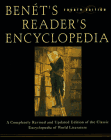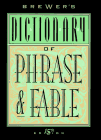|
| |
Desk references are an intricate component of enriching your understanding of anything
you read, including Shakespeare. I've included some that have been very helpful to
me, and I hope will help you.

 Benet's Reader's
Encyclopedia Benet's Reader's
Encyclopedia
Hardcover - 1144 pages 4th edition (September 1996)
HarperCollins Publishers

 Brewer's Dictionary of Phrase
& Fable Brewer's Dictionary of Phrase
& Fable
(15th Ed) by Ebenezer Cobham Brewer, Adrian Room
(Editor), Ivor H. Evans
Hardcover 15th edition
Harper Collins (November 1995)
Where do you look when Shakespeare says
something like Fly, fly like Mercury to open the door? If you haven't studied
mythology you may not know who Mercury is. You can look in an ordinary dictionary
and find out usually, oh -- who Mercury's parents are. But to truly understand the
simile, you need Brewer's Dictionary of Phrase and Fable. I have found this
invaluable in reading any literature written before this century, when the names of gods
and mythical figures were commonly used as a kind of shorthand. It's also handy when
you're working on the crossword puzzle.

 The Elements of Style The Elements of Style
by William Strunk, Jr. and E. B. White.
Hardcover - 85 pages
3rd indexed edition (February 1979) Allyn & Bacon.
Is there a more useful manual for
writers? Or for anyone who needs to communicate clearly and concisely? I have
been using this book since a wonderful English teacher introduced us to it in High
School.
In the Introduction, E.B. White says, "At the close
ofthe first World War, when I was a student at Cornell, I tool a course called English 8.
. . The year was 1919. The [Elements of Sytle] was known as "the
little book," with the stress on the word "little." It had been
privately printed by the author . . . Some thirtyeight years later, the book bobbed up
again in my life when MacMillan commissioned me to revise it for the college market and
general trade."
Especially good for students who are overwhelmed by grammar
handbooks. Highest recommendation.
 Order the paperback edition. Order the paperback edition.

 Merriam-Webster's Merriam-Webster's
Reader's Handbook
Take the mystery out of the language of literature.
 | Nearly 2,000 entries including Greek and Latin terminology |
 | Descriptions for every major genre, style, and era of writing . Assured quality
from the combined resources of Merriam-Webster and Encyclopędia Britannica. |
 Merriam Webster's Collegiate Dictionary (10th
Edition) Merriam Webster's Collegiate Dictionary (10th
Edition)
This is the premier, affordable desk reference tool. It includes:
 | More than 215,000 definitions with clear, accurate definitions and carefully researched
pronunciations and . . . |
 | More than 700 illustrations, 76,000 dates of earliest recorded use, and nearly 35,000
etymologies detailing word origins and . . . |
 | Synonym and usage paragraphs and a Handbook of Style for practical advice on using words
wisely and . . . |
 | Special sections on abbreviations, biographical and . . . geographical names, and
foreign words and phrases and . . |
 | It features a red linen, hardcover binding and it is indexed. |
1600 pages 10th Index edition (May 1996)
Merriam Webster.
 Merriam Webster's Collegiate Dictionary Merriam Webster's Collegiate Dictionary
This edition includes the features listed above. However,
it has a laminated cover and no page indexes.
 Merriam-Webster's Collegiate Dictionary, Tenth Ed. &
Deluxe Electronic Ed. Merriam-Webster's Collegiate Dictionary, Tenth Ed. &
Deluxe Electronic Ed.
The top of the line of the affordable desk
references (see above listing) plus a CD-ROM. I often use a dictionary CD-ROM when I am
writing at my computer so I can check word meanings as I write and as I edit. You get the
10th edition dictionary with all the features listed above and a CD-ROM that includes the
full text of the dictionary and the Collegiate Thesaurus, with 21 search options and 1,000
black and white illustrations - for Windows and Macintosh computers. This edition
won a prize -- the BOOKSELLERS' CHOICE: New Media (1995) from the American
Bookseller Association.Software Book & CD ROM edition (June 1996), Merriam Webster.
|